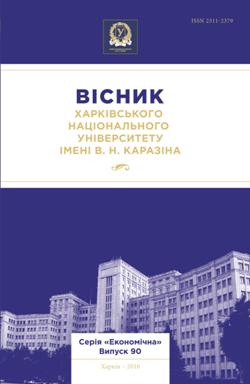M. I. TUGAN-BARANOVSKY`S VIEW ON STATE REGULATION OF THE NATIONAL ECONOMY COMPETITIVENESS: CRITICAL COMPREHENSION
Abstract
The article presents the results of the performed research of causes of economic, medium–term crises and cycles in M. I. Tugan-Baranovsky`s work «Industrial crises. A sketch of the social history of England». The basis of the author's study of this work has been given in two interrelated theoretical and methodological aspects. The author has researched the sequence of rises and recessions identified by M. I. Tugan-Baranovsky in the macroeconomic dynamics of England in the 19th century. Extensive statistics is a reliable basis for recognising M. I. Tugan-Baranovsky`s findings as a common pattern of economic development in industrialized countries.
These aspects were later investigated by his student, a world-famous economist M. D. Kondratyev within the framework of the theory of big cycles (55–60 years). The second aspect of M. I. Tugan-Baranovsky`s work covers social consequences of cyclic economy development of the world`s scientific and technological progress leader in the 19th century, that was then England. In particular, the failure of the state`s attempts to prevent negative social implications for the people during long deep crises has been shown. The sequential process of the change of the cycle phases revealed by M. I. Tugan-Baranovsky has been analysed in the work. Selected years of crises are separated by intervals of 10–11 years. On this basis, the research tradition of Russian and Ukrainian scientists in the theory of cycles was continued. Moreover the phases of industrial crises of England in the second half of the 19th century comprised over a decade. In this process, the graduate student has determined two contradictions in the article. The first is that the instrument of production is owned by people who are not involved in the production, while direct producers have no property.
The second contradiction is that the organized character of production within one enterprise does not coincide with the chaotic character of its economy. As it is shown in the article by the graduate student, the coincidence of these contradictions in time prompted M. I. Tugan-Baronоvsky the conclusions on the regularity of these identified cycles and crises. On this basis, the author has suggested the classification of constraints and stimulants (exogenous and endogenous factors) of state regulation of competitiveness of the basic kinds of production of Ukrainian national economy to implement the strategic course on European integration.
Downloads
References
2. Єгоров І. Ю. «Інноваційна Україна – 2020» : основні положення національної доповіді / І. Ю. Єгоров // Економіка України. – 2015. – № 9. – С. 4–11.
3. Тарасевич В. М. Про державну капіталістичну обумовленість інституціонального розвитку національної економіки / В. М. Тарасевич // Економіка України. – 2015. – № 12. – С. 10–19.
4. Арбатова Н. Посткризисные модели европейской интеграции / Н. Арбатова // Мировая экономика и международные отношения. – 2014. – № 4. – С. 31–39.
5. М. І. Туган-Барановський: вчений, громадянин, державний творець. Економіка України. – 2015. – № 3. – С. 84–87.
6. М. И. Туган-Барановский. Промышленные кризисы: очерк из социальной истории Англии / М. И. Туган-Барановский. – К. : Наукова думка, 2004. – 368 с.
7. Кондратьев Н. Д. Михаил Иванович Туган-Барановский, Н. Д. Кондратьев. – М. : МФК, 2004. – 119 с.
8. Гриценко А. А. Методологічне значення поглядів М. І. Туган-Барановского на категорії цінності та вартості для розвитку сучасної економічної теорії /А. А. Гриценко // М. І. Туган-Барановський: творча спадщина та сучасна економічна наука : матеріали міжнар. науково-практ. конф. – Х : ХНУ імені В. Н. Каразіна, 2015. – С. 17-22.
9. Фридрих А. фон. Хайек. Познание, конкуренция и свобода / Фридрих А. фон Хайек. – СПб. : Пневма, 1999. – 288 с.
10. Стоун Р. Статистика общественного развития / Р. Стоун. – СПб. : Гуманистика, 2003. – С. 402–434.
11. Уотермен Р. Фактор обновления. Как сохраняют конкурентоспособность лучшие компании / Р. Уотермен. – М. : Прогресс, 2001. – 279 с.
12. Про Стратегію сталого розвитку «Україна-2020» : Указ Президента України від 12 січня 2015 року № 5/2015 [Електронний ресурс]. – Режим доступу : http://www.president.gov.ua/documents/18688.html.

